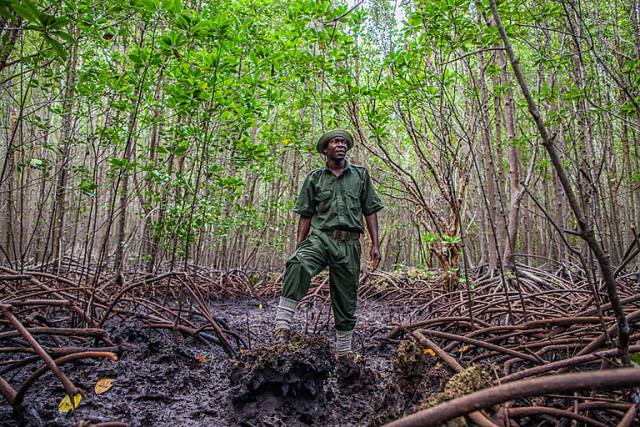Africa’s unique natural capital assets were the center of conversation at the 2022 Africa Green Economy Conference. Held in a hybrid format from June 27 to 30, participants gathered to discuss the value of nature in Africa’s economy and call for more nature-positive ventures in development.
Hosted by the Green Growth Knowledge Partnership (GGKP), Capitals Coalition, Green Economy Coalition (GEC), and World Wide Fund for Nature (WWF), the conference featured virtual opening and closing plenary sessions and themed in-person national conversations around the continent. These sessions took place in South Africa, Uganda, Gabon, and Mozambique.
Participants stressed that the conference was coming at a unique moment in the face of several global economic shocks affecting Africa: climate change, biodiversity loss, and geopolitical challenges.
“The failure of the current system’s existing global cooperation mechanism to meet these challenges equitably and sustainably is leading to the current calls for the review of the global system,” moderator Kevin Urama, Acting Chief Economist and Vice President for Economic Governance and Knowledge Management, African Development Bank said.
Most countries are falling short of the climate action needed to meet their 2015 Paris Agreement emission reduction targets. Climate finance to help developing countries meet targets is also lagging.
Oliver Greenfield, Convenor, Green Economy Coalition, argued that the limited progress on environmental action resulted from policymakers’ continual emphasis on economic gains above all else.
“We accept that development is the priority and environment is the trade-off. That’s largely what’s happened for 50 years […] Avoidance of crisis is not the best investment model for most finance ministers, we know that,” he said.
Greenfield suggested policymakers consider investments that contribute to the best outcome in multiple areas—environmental, social, and economic.
Considering the environment alongside the economy would be very beneficial for Africa, stressed Dr Mao Amis, Co-founder and Executive Director of the African Center for Green Economy.
He added that in most African countries, natural capital accounts for 30-50 percent of their total wealth. In Sub-Saharan Africa, over 70 percent of people depend on forests and woodlands for their livelihoods.
“The value of nature in the economy is undisputed. We are so intricately linked to nature that we cannot disassociate our relationship with nature, and the more we recognize that, the more we can make strides in achieving the role of nature in the economy,” he said.
Tapping into nature—and pursuing nature-positive investments—is seen as an avenue for wealth creation by policymakers.
Ligia Noronha, UN Assistant Secretary-General and Head of UNEP, New York Office, views nature-positive investments as a great risk mitigation instrument and a key investment strategy for the continent.
“This is absolutely obvious, but it has perhaps not been invested in sufficiently. Africa has a tremendous amount of natural capital stocks both in minerals and biodiversity, and this can be a tremendous asset for the growth of Africa,” she said.
She added that natural capital could also create many green jobs for Africa’s population.
Multi-stakeholder engagement, however, is needed to center nature’s place in national economic development.
Dr Gabi Teren, Programme Manager, Endangered Wildlife Trust, highlighted that greater skills and communication across sectors are needed to drive action on environmental targets.
“Ultimately, without the companies being involved at all levels, there aren’t enough experts necessarily to have the skills to apply these tools. […] To really have a truly green economy, we have to have far better communication between the private sector, between [small medium enterprises], between environmental practitioners, and between policymakers,” she said.
The involvement of the finance sector, in particular, is crucial.
According to a presentation by the World Resources Institute, access to financing and the limited participation of the private sector are two of the biggest challenges to implementing nature-based solutions (NBS) in Africa.
Nature-based solutions are initiatives involving nature that solve societal challenges while building up natural ecosystems and biodiversity. For example, conserving mangrove forests can protect homes from the impacts of storms and provide nurseries for fish.
NBS can help fulfill critical infrastructure needs, explained Lizzie Marsters, Environmental Finance Manager, World Resources Institute. According to her, NBS can meet 12 percent of Africa’s 90 trillion US dollar infrastructure needs by 2035.
Marsters situated NBS as pivotal to incorporating sustainability and resilience into infrastructure investments.
“When we think about NBS, we think that there’s tremendous opportunity here to re-evaluate how we think about public budgets, how they are spent, and increased private sector participation,” Marsters said.
Closing the conference, moderator Kevin Urama emphasized Africa’s integral relationship with nature.
“Africa can and should take the lead on this … Africa’s culture has always been nature sensitive,” he said.
Natural capital ought to be intertwined in most development planning, he added.
“Let’s work on natural capital, how to invest in natural capital, how to value natural capital and factor it into our decision making, into our national development planning,” he said.
IPS UN Bureau Report
